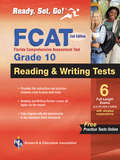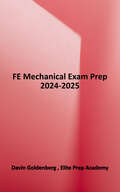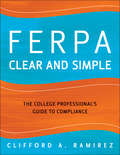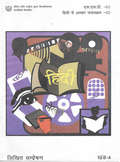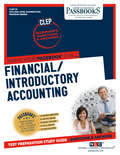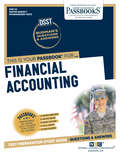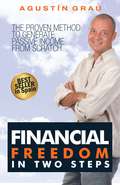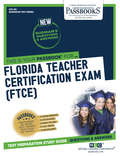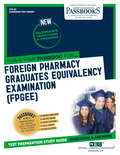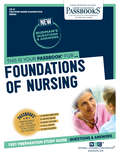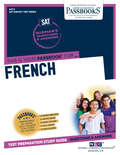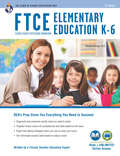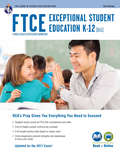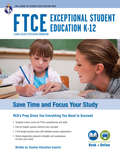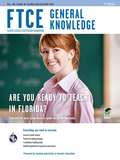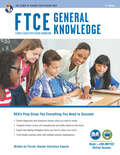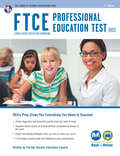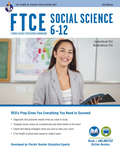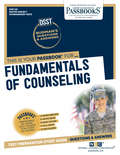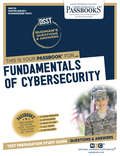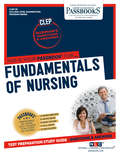- Table View
- List View
FCAT Grade 10 Reading and Writing 2nd Ed.
by F. BanuEvery tenth grade student in Florida must pass the FCAT... Are you ready for the FCAT Reading and Writing Exams? REA's FCAT Reading and Writing test prep with bonus online tests helps you sharpen your skills and pass these exams! This second edition of our popular test prep provides the up-to-date instruction and practice that tenth grade students need to improve their reading and writing skills and pass these two state-required exams. The comprehensive review features student-friendly, easy-to-follow lessons and examples that reinforce the key concepts tested on the FCAT Reading and Writing exams, including: * Vocabulary * Literary analysis * Drafting * Revising Focused lessons explain reading and writing principles in easy-to-understand language that's suitable for tenth grade students at any learning level. Our tutorials and targeted drills increase comprehension while enhancing your skills. Color icons and graphics throughout the book highlight must-know concepts. Test-taking tips and strategies in each chapter give you an added boost of confidence so you can do your best on the exam. Six practice exams help you prepare for the FCAT! The book contains four full-length practice exams (two reading and two writing) that allow you to test your knowledge while reinforcing what you have learned. Two additional reading practice tests not found in the book are available online - for a total of six exams! Each practice test comes complete with detailed explanations of answers, allowing you to focus on areas in need of further study. Whether used in a classroom, for home or self study, or with a tutor, this test prep gets students ready for the FCAT Reading and Writing exams, set to take on new challenges, and helps them go forward in their studies! This book is a "must-have" prep for anyone taking the FCAT.
FE Mechanical Exam Prep: The Most Complete And Practical Study Guide To Get Ready For The Current Exam In 2 Weeks And Pass It On First Try (1000+ Ncees Aligned Practice Problems Included)
by Elite Prep Academy Davin GoldenbergGet Ready for The Fe Mechanical Exam in 2 Weeks and Pass It On First Try Do you want to get to the exam day with the confidence to pass on the first try, stand out from your peers, and secure your best future as a licensed engineer? The Elite Prep Academy Finally Makes Public the Ultimate ALL-IN-ONE Guide that Has Already Enabled Thousands of Aspiring Licensed Professionals Securing a Stable and Fulfilling Engineer’s Career - If You Fail the Fe Mechanical Exam On First Attempt Your Chances To Pass It On Second Try Drop Down To 35% - According to the National Council of Examiners for Engineering and Surveying, the average FE Exam pass rate is 71%, but it drops incredibly down to 35% for those retaking the exam a second time! - This suggests that failing the FE exam will get you caught in a vicious circle of repeated attempts and failures from which it will be really difficult to break free, thus making it vital to pass on first try - That’s why the Elite Prep Academy with the help of one of the most successful exam coaches David Goldberg, created the FE Mechanical Exam Prep study guide, the most complete and practical study guide to get ready for the FE mechanical exam in 2 weeks and pass it on your first try In This Fully Updated Guide, You’ll Get: - The Most Detailed FE Mechanical Exam Review - Complete Break-Down of Every Exam’s Knowledge Area - NCEES Handbook Aligned Topics, Formulas and Principles - Detailed Explicative Graphics, Tables and Diagrams - Effective Strategies to Master the NCEES Handbook Navigation - The Most Complete FE Mechanical Exam Practice - 1000+ NCEES Aligned Practice Problems and Answers - Real-Life Exam Experience to Boost Your Improvement - Complete Practice for All the Exam Knowledge Areas - Adaptable and Motivating 2 Weeks Study Plan - Access to Our NCEES Aligned Private Platform - FE Mechanical Key Video Lessons - FE Mechanical Problems & Answers - FE Mechanical Printable Flashcards
FERPA Clear and Simple
by Ramirez Clifford A.Family Educational Rights and Privacy Act (FERPA) compliance has always been challenging due to complex regulatory language and exposure to risk. However, institutions that do not comply are in jeopardy of losing federal funding. Accessible and user-friendly, FERPA Clear and Simple clarifies the regulations and provides a ready reference for compliance and problem solving. This need-to-have guide offers critical and relevant material (including the 2008 Amendments) from a new perspective to help staff in student affairs, academic departments, and administrative support positions understand and comply with FERPA guidelines.
FHD - 02 Hindi Me Aadhar Pathyakram - Khand 1 Bhasha Aur Sampreshan - IGNOU: FHD - 02 हिंदी में आधार पाठ्यक्रम - खंड 1: लिखित सम्प्रेषण - इग्नू
by Indira VishvavidyalayaFHD-02 हिंदी में आधार पाठ्यक्रम (खंड 1: भाषा और सम्प्रेषण) – इग्नू यह किताब इंदिरा गांधी राष्ट्रीय मुक्त विश्वविद्यालय ने हिंदी भाषा में प्रकाशित किया है । हिंदी में आधार पाठ्यक्रम-02 (एफ.एच.डी.02) का यह पहला खंड है इस खंड में छह इकाइयाँ हैं । इस खंड में भाषा और सम्प्रेषण पर विचार किया गया है। सम्प्रेषण के क्रम में हम भाषा का विभिन्न स्तरों पर उपयोग करते हैं। सम्प्रेषण मुख्य रूप से बोलकर और लिखकर किया जाता है। इसके अलावा हम अपने शारीरिक अंगों के माध्यम से भी अपने भावों को प्रकट करते हैं। इसे उच्चरित भाषा, लिखित भाषा और आंगिक भाषा के नाम से जाना जाता है। इन तीनों भाषिक अभिव्यक्तियों पर हमने अलग अलग इकाइयों में विचार किया है।
FINANCIAL ACCOUNTING: Passbooks Study Guide (College Level Examination Program Series (CLEP) #Dantes-15)
by National Learning CorporationThe College Level Examination Program (CLEP) enables students to demonstrate college-level achievement and earn college credit in various subject areas based on knowledge acquired through self-study, high school and adult courses, or through professional means. The CLEP Financial Accounting Passbook® prepares you by sharpening knowledge of the skills and concepts necessary to succeed on the upcoming exam and the college courses that follow. It provides a series of informational texts as well as hundreds of questions and answers in the areas that will likely be covered on your upcoming exam, including but not limited to: general accounting principles and practices; the income statement; the balance sheet; and more.
FINANCIAL ACCOUNTING: Passbooks Study Guide (DANTES Subject Standardized Tests (DSST) #Dantes-15)
by National Learning CorporationThe DSST Subject Standardized Tests are comprehensive college and graduate level examinations given by the Armed Forces, colleges and graduate schools. These exams enable students to earn college credit for what they have learned through self-study, on the job, or by other non-traditional means. The DSST Financial Accounting Passbook® prepares candidates for the DSST exam, which enables schools to award credit for knowledge acquired outside the normal classroom environment. It provides a series of informational texts as well as hundreds of questions and answers in the areas that will likely be covered on your upcoming exam.
FINANCIAL FREEDOM IN TWO STEPS The proven method to generate passive income from scratch
by Agustin Grau Keith BaddeleyAt last! Stop worrying about money. Start making money. Obtaining your financial freedom is simple using this proven method that I’ll show you. I have been using it for years and it’s easy enough for anyone to implement, whether they have experience or not. To make money, you don’t need to have money. You just need knowledge to lead you to money. This “knowledge” is what you’ll find in this book. A clear, simple and precise method that explains how to generate passive income from scratch, without needing to have money to invest. A two-step method: first, generate some money; second, invest that money earned. In simplicity is power. The key to financial independence is creating assets: making things that bring in a constant flow of cash every month. What’s more, this needs to happen in automatic mode and for an indefinite period of time. You can then keep on enjoying the income, as can your children even after you die. This is not science fiction: it’s a system, a passive income strategy that will provide you with freedom, financial freedom, financial independence and money. Why are there not more people doing it? Because they’re too busy working, tied to their jobs and not generating income. They’re focused on not being free and not being happy. The focus of this book, however, is something else. What? Abundance, wealth, fulfillment, creativity, personal growth, strategy, joy, prosperity and happiness. In this book, you will learn: •To make money, even though right now you have nothing. •To create assets that will bring in money every month. •To design a strategy that will make your money work for you. •To set up a system that will allow you to earn an income automatically, recurrently and continuously. •To develop yourself personally, putting to use your
FLORIDA TEACHER CERTIFICATION EXAM: Passbooks Study Guide (Admission Test Series)
by National Learning CorporationThe Admission Test Series prepares students for entrance examinations into college, graduate and professional school as well as candidates for professional certification and licensure. The Florida Teacher Certification Exam (FTCE) Passbook® prepares you by sharpening the skills and abilities necessary to succeed on your upcoming entrance exam. It provides hundreds of questions and answers in the areas that will likely be covered on your upcoming exam.
FOREIGN PHARMACY GRADUATES EQUIVALENCY EXAMINATION: Passbooks Study Guide (Admission Test Series)
by National Learning CorporationThe Admission Test Series prepares students for entrance examinations into college, graduate and professional school as well as candidates for professional certification and licensure. The Foreign Pharmacy Graduates Equivalency Examination® (FPGEE®) Passbook® prepares you by sharpening the skills and abilities necessary to succeed on your upcoming entrance exam. It provides a series of informational texts as well as hundreds of questions and answers in the areas that will likely be covered on your upcoming exam, including but not limited to: basic biomedical sciences; pharmaceutical sciences; pharmacy sciences; clinical sciences; and more.
FOUNDATIONS OF NURSING: Passbooks Study Guide (Certified Nurse Examination Series)
by National Learning CorporationThe Certified Nurse Examination Series prepares individuals for licensing and certification conducted by the American Nurses Credentialing Center (ANCC), the National Certification Corporation (NCC), the National League for Nursing (NLN), and other organizations. The Foundations of Nursing Passbook® provides a series of informational texts as well as hundreds of questions and answers in the areas that will likely be covered on your upcoming exam.
FRENCH: Passbooks Study Guide (College Board SAT Subject Test Series #Clep-44)
by National Learning CorporationSAT Subject Tests, developed by the College Board, are required by many colleges and universities as part of their admission requirements. The SAT French Passbook® prepares you for your test by allowing you to take practice exams modeled after the real SAT Subject Test. It provides hundreds of questions and answers similar to the ones you will find on your upcoming exam.
FRSR Part I
by Muthuswamy Brinda SanjeevFor the sake of convenience of the readers and facility of easy handling, the compilation is being brought out in four parts. The first part contains the Fundamental Rules and Supplementary Rules excluding rules regarding Travelling Allowances, and the related Appendices. The second part contains the Supplementary Rules — Travelling Allowances and the related Appendices. The chapters on leave from both the Fundamental Rules and the Supplementary Rules which have become more of historic significance than of current application, have been deleted and in their place the Central Civil Services (Leave) Rules, 1972, has been brought out as Part-Ill of this compilation, complete in itself with all relevant Government of India decisions and administrative instructions. Part-IV contains all general orders issued up-to-date on Dearness Allowance, Dearness Relief to Pensioners and exgratia to CPF Beneficiaries, House Rent Allowance, Tough Location Allowance, etc., the stations covered for these purposes and the details of Urban Agglomeration as per 2001 Census.
FRSR Part II
by Muthuswamy BrindaFRSR Part-II contains the Supplementary Rules relating to Travelling Allowances and orders regarding Conveyance Allowance and Transport Allowance. The Central Civil Services (Leave) Rules, 1972, has been brought out as Part-Ill of this compilation, complete in itself with all relevant Government of India decisions Consequent to the abolishment of CCA, FR & SR.
FRSR Part III
by MuthuswamyAn up-to-date, comprehensive, self-contained and reliable reference compendium on CCS (Leave) Rules, 1972, presented in an easy-to-refer manner with brief meaningful headings for Government decisions. Recommendations of the Seventh Pay Commission Report accepted by the Government incorporated. Orders regarding CL, Special CL in a separate Appendix. All orders, audit instructions and decisions in FRs, SRs and RLRs not codified so far, included. An indispensable reference book for use in all Central Government Offices.
FRSR Part IV Competitive Exam
by MuthuswamyAs usual the main rules are given in antique type and Government orders and Audit rulings in Roman type with appropriate headings so as to enable the readers to pick out the relevant decisions without any difficulty. The chapter alignment and rule numbers are the same as in the Government compilation. For any subsequent corrections/amendments, readers are advised to subscribe to our monthly journal Swamy news wherein we reproduce the latest orders issued by Government on service and financial rules.
FTCE Elementary Education K-6 Book + Online (FTCE Teacher Certification Test Prep)
by Betty Neilsen Green Nancy Ann Tattner Rhonda AtkinsonREA's FTCE Elementary Education K-6 Test Prep with Online Tests Gets You Certified and in the Classroom! Updated Third Edition Nationwide, more than 5 million teachers will be needed over the next decade, and all must take appropriate tests to be licensed. REA gets you ready for your teaching career with our outstanding library of teacher certification test preps! Scoring well on the FTCE Elementary Education K-6 exam doesn't just help you get certified to teach in Florida, it helps you build your career. This updated edition of our popular FTCE test prep is designed to help you master the information on the Elementary Education K-6 exam. It's perfect for college students, prospective teachers, and career-changing professionals who are seeking certification as elementary education teachers. Written by a Florida education expert, our study package contains an in-depth review of all the competencies tested on the FTCE Elementary Education K-6 exam: language arts, math, social science, and science. Expert test-taking tips and strategies offer advice on how to raise point scores. An online diagnostic test helps you assess your skills and gauge your test-readiness. The diagnostic exam replicates the FTCE question format and comes complete with detailed answer explanations, so you can see where you need extra study and review. A full-length multiple-choice practice test in the book simulates actual FTCE exam questions. This practice test is balanced to include every type of question, subject area, and skill tested on the FTCE Elementary Education K-6 exam. An additional practice test is available online at the REA Study Center. This test is offered in a timed format with automatic scoring, timed testing conditions, and diagnostic feedback. Detailed answer explanations and instant reports help you zero in on the topics and types of questions that give you trouble now, so you can succeed on test day. This test prep is a must-have for teacher certification candidates in Florida!
FTCE Exceptional Student Education K-12 (FTCE Teacher Certification Test Prep)
by Nancy Ann Tattner Maryann Gromoll Dr Ken SpringerREA's FTCE Exceptional Student Education K-12 Test Prep with Online Practice TestsGets You Certified and in the Classroom - for 2018-2019 and Beyond!Nationwide, more than 4 million teachers will be needed over the next decade, and all must take appropriate tests to be licensed. REA gets you ready for your teaching career with our outstanding library of Teacher Certification test preps. Fully updated to align with the Sept. 2017 exam changes, REA’s test prep is designed to help teacher candidates master the information on the FTCE Exceptional Student Education K-12 exam and get certified. It's perfect for teacher education students and career-changing professionals who are seeking certification in Florida to teach students with special needs. Written by Florida education experts, our complete study package contains an in-depth review of all the competencies tested on the FTCE Exceptional Student Education K-12 exam, including knowledge of foundations of exceptional student education, knowledge of assessment and evaluation, knowledge of instructional practices in exceptional student education, knowledge of the positive behavioral support process, knowledge of multiple literacies and communication skills, and knowledge of the transition process. . Two full-length online practice exams run under timed-testing conditions and provide automatic scoring and diagnostic feedback on every question to help students zero in on the topics and types of questions that give them trouble now, so they’ll be prepared on test day.The book includes the same two practice tests that are offered online, but without the added benefits of detailed scoring analysis and diagnostic feedback. This complete test prep package comes with a customized study schedule and REA's test-taking strategies and tips.This test prep is a must-have for anyone who wants to teach special needs students in Florida!
FTCE Exceptional Student Education K-12 Book + Online (FTCE Teacher Certification Test Prep)
by Editors of REAREA's FTCE Exceptional Student Education K-12 Test Prep with Online Practice TestsGets You Certified and in the Classroom!Nationwide, more than 4 million teachers will be needed over the next decade, and all must take appropriate tests to be licensed. REA gets you ready for your teaching career with our outstanding library of Teacher Certification test preps.Our test prep is designed to help teacher candidates master the information on the FTCE Exceptional Student Education K-12 exam and get certified. It's perfect for college students, teachers, and career-changing professionals who are looking to become Florida Special Education teachers.Written by Florida education experts, our complete study package contains an in-depth review of all the competencies tested on the FTCE Exceptional Student Education K-12 exam, including knowledge of language development, reading and communication skills, assessment and evaluation, teaching interpersonal interactions, and more. Two full-length practice tests are offered online in a timed format with instant scoring, diagnostic feedback, and detailed explanations of answers. Each test features every type of question, subject area, and skill you need to know for the exam. Our online practice tests replicate the FTCE question format, allowing you to assess your skills and gauge your test-readiness. The online tests at REA's Study Center offer the most powerful scoring and diagnostic tools available today. Automatic scoring and instant reports help you zero in on the topics and types of questions that give you trouble now, so you'll succeed when it counts. Every practice exam comes with detailed feedback on every question. We don't just say which answers are right - we explain why the other answer choices are wrong - so you'll be prepared on test day.The book includes the same two practice tests that are offered online, but without the added benefits of detailed scoring analysis and diagnostic feedback. This complete test prep package comes with a customized study schedule and REA's test-taking strategies and tips. This test prep is a must-have for anyone who wants to teach Exceptional Students in Florida!
FTCE General Knowledge 2nd Ed.
by Leasha Barry Alicia MendozaREA's FTCE General Knowledge Test Prep Gets You Certified and in the Classroom! Updated Second Edition Nationwide, more than 5 million teachers will be needed over the next decade, and all must take appropriate tests to be licensed. REA gets you ready for your teaching career with our outstanding library of Teacher Certification test preps! Scoring well on the FTCE (Florida Teacher Certification Examinations) doesn't just help you get certified to teach, it helps move your career forward. REA's updated second edition of our bestselling FTCE General Knowledge test prep shows you how to score high on the exam and get certified. Written by education experts, our complete study package gives you an in-depth review of all the competencies tested on the FTCE General Knowledge exam: * English Language Skills * Essay Skills * Mathematics * Reading Our authors also give you a customized study schedule and expert test-taking strategies on how to prepare for exam day. The book includes three full-length multiple-choice practice exams to help you test your knowledge and focus on areas in need of improvement. Based on official FTCE exams, our practice tests feature every type of question, subject area, and skill you need to know for the exam. Every practice exam comes with detailed feedback on every question. We don't just say which answers are right--we explain why the other answer choices are wrong--so you'll be prepared. Our detailed explanations of answers help you identify your strengths and weaknesses while building your skills. This book is a must for anyone seeking certification as a teacher in Florida! REA books and software have proven to be the extra support teacher candidates need to pass their challenging tests for licensure. Our comprehensive test preps are teacher-recommended and written by experts in the field.
FTCE General Knowledge Book + Online (FTCE Teacher Certification Test Prep)
by Editors of REA Leasha Barry Laura Meiselman Chris A. Rose Tammy Powell Dr. Erin Mander Dr. Alicia MendozaREA's FTCE General Knowledge Test Prep with Online Practice TestsGets You Certified and in the Classroom!Nationwide, more than 4 million teachers will be needed over the next decade, and all must take appropriate tests to be licensed. REA gets you ready for your teaching career with our outstanding library of Teacher Certification test preps.Our test prep is designed to help teacher candidates master the information on the FTCE General Knowledge exam and get certified. It's perfect for college students, teachers, and career-changing professionals who are looking to become Florida teachers.Written by a Florida teacher education expert, our complete study package contains an in-depth review of all the competencies tested on the FTCE General Knowledge exam, including English language skills, essay skills, mathematics, and reading. Based on actual FTCE exam questions, our three full-length practice tests feature every type of question, subject area, and skill you need to know for the exam. The online tests at REA's Study Center offer the most powerful scoring and diagnostic tools available today. Automatic scoring and instant reports help you zero in on the topics and types of questions that give you trouble now, so you'll succeed when it counts. Every practice exam comes with detailed feedback on every question. We don't just say which answers are right - we explain why the other answer choices are wrong - so you'll be prepared on test day.The book includes the same practice tests that are offered online, but without the added benefits of detailed scoring analysis and diagnostic feedback. This complete test prep package comes with a customized study schedule and REA's test-taking strategies and tips. This test prep is a must-have for anyone who wants to teach in Florida!
FTCE Professional Ed (FTCE Teacher Certification Test Prep)
by Chris A. Rose Tammy Powell Dr. Erin ManderREA's FTCE Professional Education (083) Test Prep with Online Practice TestsGets You Certified and in the Classroom!Nationwide, more than 4 million teachers will be needed over the next decade, and all must take the appropriate tests to be licensed. REA gets you ready for your teaching career with our outstanding library of Teacher Certification test preps.REA's FTCE Professional Education (083) test prep is designed to help you master the information on this important exam, bringing you one step closer to being certified to teach in Florida. It's perfect for college students, out-of-state teachers, and career-changing professionals who are looking to become Florida teachers. Written by Florida teacher education experts, our complete study package contains an in-depth review of all the competencies and skills tested on the FTCE Professional Education (083) test, including: instructional design and planning, student-centered learning environments, knowledge of the Code of Ethics and Principles of Professional Conduct of the education profession in Florida, and more.Based on actual FTCE exams, our online diagnostic test and two full-length practice tests assess every competency, type of question, and skill you need to know. The online practice tests at the REA Study Center come with automatic scoring, timed testing conditions, and diagnostic feedback to help you zero in on the topics and types of questions that give you trouble now, so you can succeed on test day. The book includes the same two practice tests that are offered online, but without the added benefits of automatic scoring analysis and diagnostic feedback. This test prep is a must-have for anyone who wants to teach in Florida!
FTCE Social Science 6-12 (037) Book + Online
by Rhonda Atkinson Cynthia MetcalfFTCE Social Science Grades 6-12 Test Prep with Online Practice Tests3rd Edition - Completely Aligned with the Current Exam REA's FTCE Social Science Grades 6-12 test prep is designed to help teacher candidates pass the FTCE Social Science exam and get certified to teach. Our test prep is perfect for teacher education students and career-changing professionals who are seeking certification as social science teachers in Florida.Written by a Florida education expert and fully aligned with the latest test specifications, our book contains a targeted review of all the competencies and skills tested on the exam: geography, economics, political science, world history, U.S. history, and social science and its methodology.An online diagnostic test based on actual FTCE exam questions pinpoints strengths and weaknesses and helps you identify areas in need of further study. Two full-length practice tests (in the book and online) are balanced to include every type of question on the test. Our online tests are offered in a timed format with automatic scoring and diagnostic feedback to help you zero in on the topics and types of questions that give you trouble now, so you can succeed on test day.This test prep is a must-have for anyone who wants to become a social science teacher in Florida! REA books and software have proven to be the extra support teacher candidates need to pass their challenging tests for licensure. Our comprehensive test preps are teacher-recommended and written by experts in the field.
FUNDAMENTALS OF COUNSELING: Passbooks Study Guide (DANTES Subject Standardized Tests (DSST) #Dantes-65)
by National Learning CorporationThe DSST Subject Standardized Tests are comprehensive college and graduate level examinations given by the Armed Forces, colleges and graduate schools. These exams enable students to earn college credit for what they have learned through self-study, on the job, or by other non-traditional means. The DSST Fundamentals of Counseling Passbook® prepares candidates for the DSST exam, which enables schools to award credit for knowledge acquired outside the normal classroom environment. It provides a series of informational texts as well as hundreds of questions and answers in the areas that will likely be covered on your upcoming exam, including but not limited to: roles and functions of a counselor; theories; human growth and development; assessment; and more.
FUNDAMENTALS OF CYBERSECURITY: Passbooks Study Guide (DANTES Subject Standardized Tests (DSST))
by National Learning CorporationThe DSST Subject Standardized Tests are comprehensive college and graduate level examinations given by the Armed Forces, colleges and graduate schools. These exams enable students to earn college credit for what they have learned through self-study, on the job, or by other non-traditional means. The DSST Fundamentals of Cybersecurity Passbook® prepares candidates for the DSST exam, which enables schools to award credit for knowledge acquired outside the normal classroom environment. It provides hundreds of questions and answers in the areas that will likely be covered on your upcoming exam, including but not limited to: fundamental concepts of cybersecurity; common types of cyber-attacks; wireless security; and more.
FUNDAMENTALS OF NURSING: Passbooks Study Guide (College Level Examination Program Series (CLEP))
by National Learning CorporationThe College Level Examination Program (CLEP) enables students to demonstrate college-level achievement and earn college credit in various subject areas based on knowledge acquired through self-study, high school and adult courses, or through professional means. The CLEP Fundamentals of Nursing Passbook® prepares you by sharpening knowledge of the skills and concepts necessary to succeed on the upcoming exam and the college courses that follow. It provides a series of informational texts as well as hundreds of questions and answers in the areas that will likely be covered on your upcoming exam.
